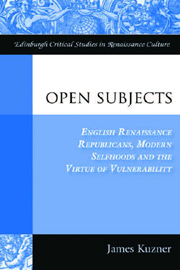Book contents
- Frontmatter
- Contents
- Acknowledgements
- Series Editor's Preface
- Introduction: Vulnerable Crests of Renaissance Selves
- 1 Legacies of Republicanism, Histories of the Self
- 2 ‘Without Respect of Utility’: Precarious Life and the Politics of Edmund Spenser's Legend of Friendship
- 3 Unbuilding the City: Coriolanus, Titus Andronicus and the Forms of Openness
- 4 ‘That Transubstantiall solacisme’: Andrew Marvell, Linguistic Vulnerability and the Space of the Subject
- 5 Habermas Goes to Hell: Pleasure, Public Reason and the Republicanism of Paradise Lost
- Epilogue: The Futures of Open Subjects
- Index
5 - Habermas Goes to Hell: Pleasure, Public Reason and the Republicanism of Paradise Lost
Published online by Cambridge University Press: 12 September 2012
- Frontmatter
- Contents
- Acknowledgements
- Series Editor's Preface
- Introduction: Vulnerable Crests of Renaissance Selves
- 1 Legacies of Republicanism, Histories of the Self
- 2 ‘Without Respect of Utility’: Precarious Life and the Politics of Edmund Spenser's Legend of Friendship
- 3 Unbuilding the City: Coriolanus, Titus Andronicus and the Forms of Openness
- 4 ‘That Transubstantiall solacisme’: Andrew Marvell, Linguistic Vulnerability and the Space of the Subject
- 5 Habermas Goes to Hell: Pleasure, Public Reason and the Republicanism of Paradise Lost
- Epilogue: The Futures of Open Subjects
- Index
Summary
Introduction
In this final chapter I am concerned with what counts, for Milton and for us, as the legitimate use of public reason. I build on the previous chapter by exploring a vulnerability covered there: our capacity for being affected, altered and even taken in by words, especially when they offer pleasure. I ask whether this capacity can be part of a discipline that ought to be called critical; and I conclude that Milton helps answer this question in the affirmative.
As I see Paradise Lost taking part in a discussion that extends from the classical period to the present, I place the epic not only in its own context but also alongside the work of figures such as Plato, Cicero, Habermas, Foucault and Michael Warner. Setting out with the criticism of Miltonists such as David Norbrook and Sharon Achinstein, I show how Milton has been linked with the set of Habermasian practices aimed at curbing the self's susceptibility to words and with a public way of life defined by strict, uncompromising discipline – one focused on sifting through valid and invalid rhetorical appeals, generating uncoerced consensus and fabricating durable futures. Such discipline becomes synonymous with a well-fortified critical distance from which public selves are impervious to pleasure.
Corresponding to this conception of Milton's publics, I argue, is a conception of his republicanism. Most studies – both within literary studies and in the work of historians such as Blair Worden, Quentin Skinner and Jonathan Scott – locate Milton's republicanism in ideals that link civic virtue with bounded selfhood, the public exercise of positive liberties with the maintenance of negative freedoms.
- Type
- Chapter
- Information
- Open SubjectsEnglish Renaissance Republicans Modern Selfhoods and the Virtue of Vulnerability, pp. 165 - 207Publisher: Edinburgh University PressPrint publication year: 2011



